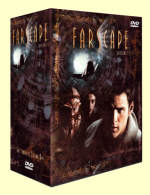Around this time each year, the World Science Fiction Convention (“Worldcon”) takes place. It touches down in a different city each year. The last one we attended was Bucconneer, in Baltimore in 1998. Before then, we went to Intersection in Glasgow in 1995, and I attended ConFiction in Den Haag in 1990. This year, the event was called Torcon 3, and it took place in Toronto. (We didn’t go. We were visting friends and food in the South of The Netherlands instead.)
Worldcon is also where the Hugo Awards are announced. The Hugos are the “audience awards” of the science fiction world. Publishers like to tout their Hugo-winning authors. People who have not heard of an author might pick up a book that has “winner of the Hugo award” splattered over its cover. For people who didn’t attend the conference itself, the awards are one of the biggest pieces of news to emerge from it. You’d think that they’d maybe put the results up on the front page of their web site, wouldn’t you?
Okay, say they didn’t put up the results on the front page. Say the results are stuck on a page somewhere deeper in the site. Surely they’d have a link to it right on the home page! Surely?
Hello–2003 calling Torcon! Anyone home? Anyone heard of content management systems? Blogs? Personal publishing tools?
The SF community has embraced fanzines and mini-publishing totally. SF fans love getting together for cons. We love hanging out on the Internet in chat rooms, on Usenet, IRC and bulletin boards. Given the sheer volume of geeks and netheads involved in SF fandom, how is it possible for Worldcon web sites to be so uniformly rubbish?
I complained about this last year as well, and nothing has changed in the intervening period:
- 2002: ConJosé. (Okay, so they did eventually put a link to the Hugos on their front page.)
- 2003: Torcon 3. (Framesets…argh.)
- 2004: Noreascon 4.
- 2005: Interaction. (Ooh, pebble texture background…very 1997!)
At least Noreascon 4 has a blog. But do you notice any difference between the main site and the blog? Something to do with clarity of design, readability, timeliness of information? Is there some kind of WSFS rule that says you’re not allowed to use a graphic designer to put together a set of page templates? Some bizarre bylaw that makes information architecture and user testing a punishable offense?
The simple, old-fashioned HTML isn’t about accessibility, either, as the frameset design for Torcon 3 does a great job of preventing useful navigation for anyone without a frames-capable browser.
Yet it’s perfectly possible for sites to be accessible, well-structured, and good-looking–all at the same time! Good visual design isn’t child’s play, but it’s not rocket science. Usability testing can be done simply and quickly. Simplicity of design can be combined with depth and breadth of information and interaction.
It’s not too much to ask, is it?
(Oh, and about the actual results for the 2003 Hugos: Robert J. Sawyer’s Hominids won the award for best novel. I haven’t read it yet, but some of the comments about it make me ambivalent about starting.)
